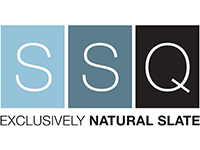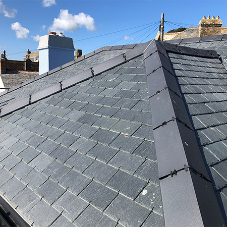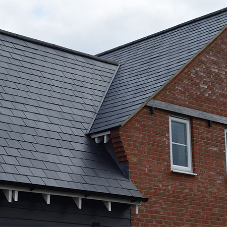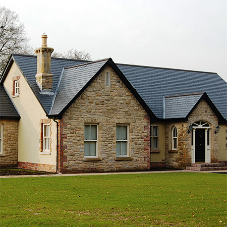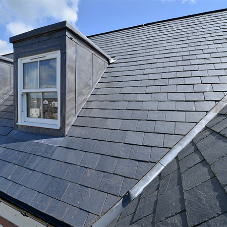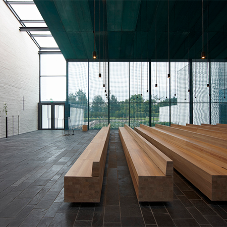Richard Cook FloR, Technical Director at SSQ, makes the case for natural slate and Phyllite as two eco-friendly roofing products ideally suited for the coming ‘net zero’ age.
Think of eco-friendly alternatives to carbon-intensive roofing, cladding and flooring materials, and natural slate might not be the first option to come to mind.
Hundreds of millions of years in the making, and a feature of man-made buildings for centuries, it’s not exactly something you’d commonly associate with futuristic, carbon-neutral construction.
But slate is actually among the greenest materials of its kind. And now, with less than thirty years before the UK hits its 2050 deadline for achieving total carbon neutrality, it’s possible that one of the world’s oldest roofing materials could become increasingly common.
Longer life spans, less need for replacement
So what is it that makes natural slate green?
One of its biggest advantages is its age and longevity.
The millions of years that products like natural slate – and Phyllite, which is even older, and that SSQ supplies as our celebrated Riverstone range – have spent slowly developing underground have given them incredible strength and durability.
Quality slate and Phyllite products can last multiple times longer than many other roofing materials, provided they’re installed correctly.
Tiles made of fibre cement and concrete, both extremely common around the world, can last up to thirty years, while clay tiles can last forty.
In all three cases, that’s considerably less than the lifetime of the average building.
Fitting a roof, like any sort of construction activity, has an environmental impact.
Materials have to be manufactured or processed, transported by air or sea, fitters and other tradespeople have to travel by car or van to the installation site, and so on – all of which has a certain cost in terms of carbon emissions.
One of the best ways of reducing a project’s environmental impact, then, is simply using products that last – products that won’t require you to carry out those same carbon-intensive processes all over again in just a few decades.
The best slate and phyllite can last over a hundred years (at SSQ, we guarantee our finest Ultra-grade Riverstone and Del Carmen products for a century).
That’s more than three times as long as some other commonly used materials – and means that quality slate often outlives the building it was originally installed on, and can then be recycled for use on other properties.
Low carbon intensity
‘Quarry’ is another word you might not immediately associate with sustainability. Try and picture one in your head, and you’ll probably imagine large amounts of gas-guzzling machinery.
But the reality – particularly at the quarries SSQ work with in Spain, and the Phyllite quarry we own in Argentina – is often a lot different.
Material is extracted with electric diamond cutters that use very little electricity, and, in many cases, it’s still split into individual slates by hand.
This is in sharp contrast to the industrial, polluting process used to produce man-made slate alternatives.
To make clay tiles, kilns are kept burning 24 hours a day, with inevitable impacts on the environment. Ceramic and porcelain tiles are even worse – the kilns have to be at higher temperatures.
This accounts for major differences in carbon intensity between different roofing materials.
Concrete tiles create 0.19kg of CO2 per kilogram. Clay tiles are worse – they produce 0.43kg per kilo. Natural slate, however, contains far less – between 0.005-0.054kg per kilo.
Slate for a sustainable society
At SSQ, our commitment to sustainability extends beyond the products we offer and how they’re quarried.
We also take steps to minimise our environmental impact in other ways – like investing in carbon offsetting.
Between January 1st 2019 and December 31st 2020, for example, we were responsible for producing 1,343 tonnes of CO2.
We’ve responded by offsetting that carbon by supporting the Gold Standard VER East Africa Borehole project, which provides clean drinking water to people in impoverished parts of Sub-Saharan Africa.
Our investment allows the Borehole project to significantly improve its energy efficiency to the value of 1,343 tonnes of carbon.
As such, we’ve also been presented with a Carbon Neutrality Certificate from the Carbon Neutral Organisation, which you can view on our website.
All in all, we believe that we – and the array of stunning, sustainable natural slate and phyllite products we provide – can make a significant contribution to the country’s quest to cut its carbon emissions.
If you’re interested in learning more, don’t hesitate to speak to SSQ today – call 020 8961 7725 or visit the website.
View Riverstone Ultra grade Product Entry

